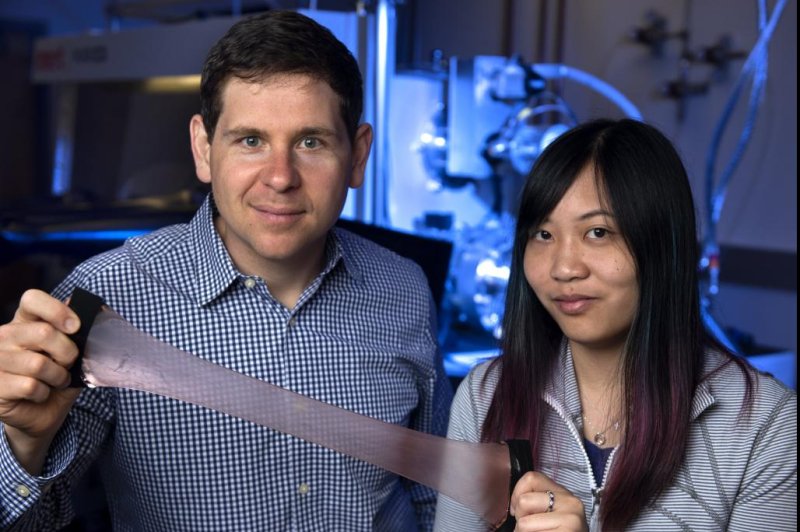Alon Gorodetsky, UCI associate professor of chemical and biomolecular engineering, and Erica Leung, a UCI graduate student in the department, stretch out their new smart material, inspired by squid skin. Photo by Steve Zylius/UCI
April 29 (UPI) -- Astronauts could soon be wrapping themselves in space blankets inspired by squid skin.
The new adaptive space blanket, designed by engineers at the University California, Irvine, will grant the user the ability to control their temperature.
"Ultra-lightweight space blankets have been around for decades -- you see marathon runners wrapping themselves in them to prevent the loss of body heat after a race -- but the key drawback is that the material is static," Alon Gorodetsky, an associate professor of chemical and biomolecular engineering at UCI, said in a news release. "We've made a version with changeable properties so you can regulate how much heat is trapped or released."
The skin of squids and other cephalopods is characterized by chromatophores, small embedded pigmented cells which can expand and contract to manipulate the skin's color and texture. In a split second, chromatophores can change from small points to flattened disks.
"We use a similar concept in our work, where we have a layer of these tiny metal 'islands' that border each other," said lead researcher Erica Leung, a graduate student at UCI. "In the relaxed state, the islands are bunched together and the material reflects and traps heat, like a traditional Mylar space blanket. When the material is stretched, the islands spread apart, allowing infrared radiation to go through and heat to escape."
Researchers plan to tweak their squid-inspired technology to manage the temperature inside buildings, tents and even electronic devices. The squid skin-like materials could be incorporated into clothing, too.
"The temperature at which people are comfortable in an office is slightly different for everyone. Where one person might be fine at 70 degrees, the person at the next desk over might prefer 75 degrees," Gorodetsky said. "Our invention could lead to clothing that adjusts to suit the comfort of each person indoors. This could result in potential savings of 30 to 40 percent on heating and air conditioning energy use."
In addition to being highly adaptive, the new material is light weight, cheap and easy to produce and highly durable. Researchers described their squid-inspired smart skin this week in the journal Nature Communications.















